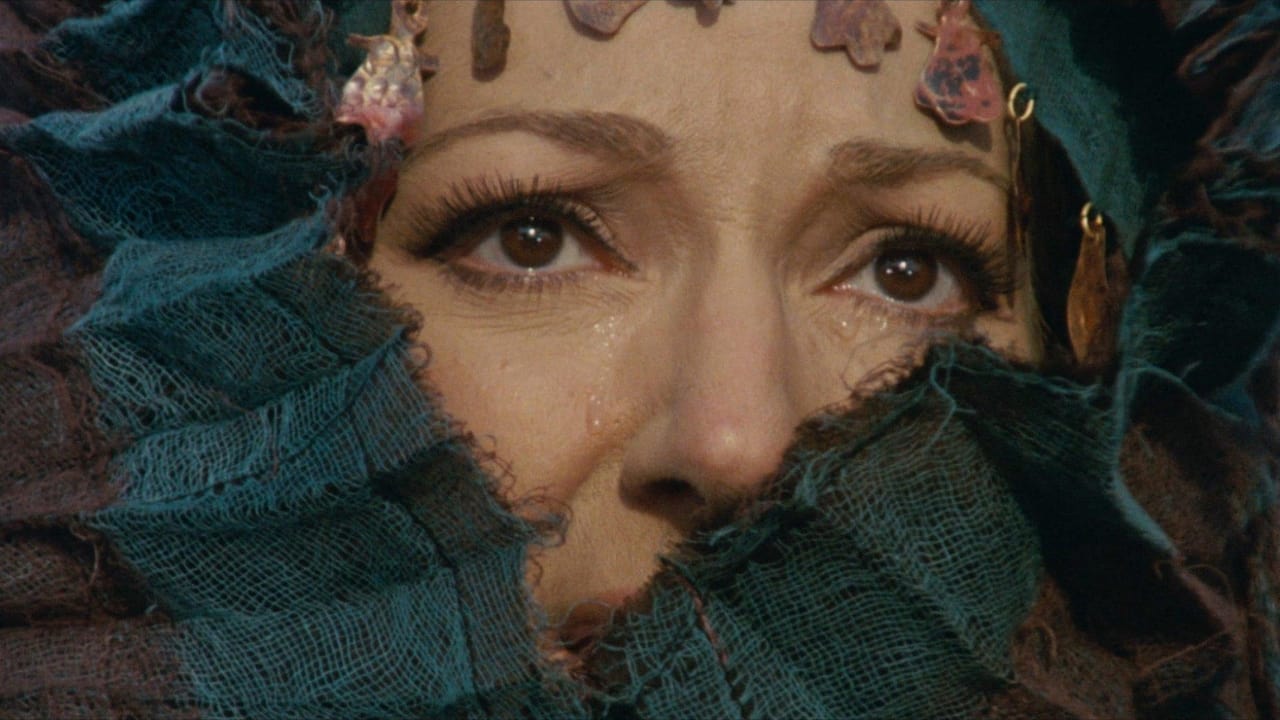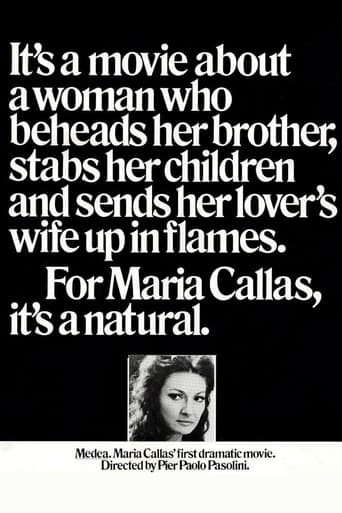

The music... same as in the other two titles of Pasolini that I have seen. There was a boy playing an instrument all through the film. And this music ended the movie, with Medea going crazy.Something of the camerawork I remember is faces that were out of focus, sometimes men's faces would be blurred in the eyes of Medea. This can show a perspective, how she didn't see Jason clearly for who he was.The killing of children, although implied, wasn't shown. I think that makes it even more powerful, because in the last scene Medea, reversely, caresses her children, lovingly.We see a sense of loss of her identity, first of all, because Medea doesn't even seem to realize how she kills her children. If we truly are put in her head, than everything is very chaotic, all over the place, all over the time. Guided by the strange music that a boy with her sons plays. Sometimes Medea will drift off, and then as she wakes up, we find out she has done something horrible, but not us, nor Medea, had any idea.When the maids undress her from the black clothes and put white gown on her instead, making Medea look like them, there is a sense of repression. Now that I think about it, this sense of repression is present in other Pasolini films too.It is also about how the repression breaks into a revolt. In Porcile, the boy is eaten by pigs, a repression replaced with extreme violence. Something similar in Oedipus Rex, where Oedipus destroys his eyes with metal sticks. As if throwing all anger and fear into one final move of hands. And the same happens here. The entire town is burning, the children are dead, and Medea is in the middle of all this with a black dress. Her repressed self has come through.
... View Morein time. in space. to origins. to old rituals and sacrifices and definition of purpose of life. an experience. beyond words. before myths. and an unique Medea. the Pasolini style. it is the easy verdict. the only role in a film of Maria Callas. the corruption of Euripides text . natural observations. but each becomes, scene by scene, wrong. because it is only a travel. the voices, the gestures, the sacrifices, the thought who becomes deed - as the great surprise/confusion source for the viewer - the lights and buildings and costumes and air almost material are shadows of steps. the revenge . and the end of circle. it is not Edipo re . it is Medea. and this fact is remind in every moment. because it is an emotion more than a show. because it is a lesson about fertility and love and magic and jealousy and survive who has not need of explanations. only need of silence. and science to discover the embroidery of light and shadow in each scene. as the experiences of travel.
... View MoreI first saw Medea in college and was highly critical of it, finding it disappointing on almost all counts: terrible sound editing, cheap film stock, over bright lighting, bizarre, amateurish acting styles, inadequately edited, etc. Then there was the extended murder scene of Glauce and Creon going seemingly on forever, and then . . . wait; what's this? It's repeated all over again? Did someone get the wrong reel into the house?Another ten years went by before I watched it again and after the second viewing, found myself emotionally drained, my jaw on the floor with the realization that I'd just finished a film that alternately horrified, fascinated and astonished me.Medea is a grim, violent, film, minimally processed which only adds to its gruesome, wild rawness. This is Pasolini's Medea, not Euripedes and it is not easy viewing. Its wild, African/Middle Eastern score with the nasal bleating of women's voices in near pre-historic sounding rhythmic chant adds further to the element of being "out there" this film produces: This is about as far away from popular cinema as one can get. Medea doesn't easily compare to films of any other style or genre; not even with some of Pasolini's other work. But, if you can succumb to its hypnotic, mesmerizing pace at once both frenetic and static - you will realize this is as about as close to a hallucinatory experience one can achieve without the use of an illegal substance. Granted, not everyone wants that experience.As Medea, Callas is simply amazing. Oddly, when the film came out she was roundly criticized for not being able to transfer the magic she so naturally gave on stage to the big screen. I will strongly disagree. The more I watch this film (which is probably several times a year for well over a decade), the more amazed I am by her performance in it. Where I, too, had first been critical of her languid weirdness, I've grown to see her commitment to the role. I've come to be riveted to her painfully expressive mask as she completely inhabits this character who is, quite literally, capable of everything (yes - everything is the right word here).Where I was once critical of the lighting, I've grown up to realize what Pasolini did; why he chose to film at the times of day he chose, and the resulting, fascinatingly brutal and surreal luminosity that bathes the entire film and the almost palpable sense of its visual texture. Stunning. The landscapes Pasolini chose to film in are as brutal and as vital as the characters of the tale. His near excision of all spoken text ( the screenplay is nearly dialogue free) brings us into a timeless, yet somehow ancient world where all is understood without the use of verbal communication. The savage, bloody rites of sacrifices for fertility and harvest initially seem barbarous then become somehow beautiful and fascinating. Then they make one cringe with the realization of how, not so long ago, this was us.A remarkable, savage and beautiful film.
... View MoreMaria Callas is both stoic and expressive as Pasolini's Medea, while Jason is depicted as playfully self-obsessed. This is a prehistoric view of Euripides and quite accessible. There's a pretentious touch of modernity, but the striking opening ceremony vividly sets the mood of the piece and the double-dose finale is effective. The evocative music sounds like judgement day!
... View More